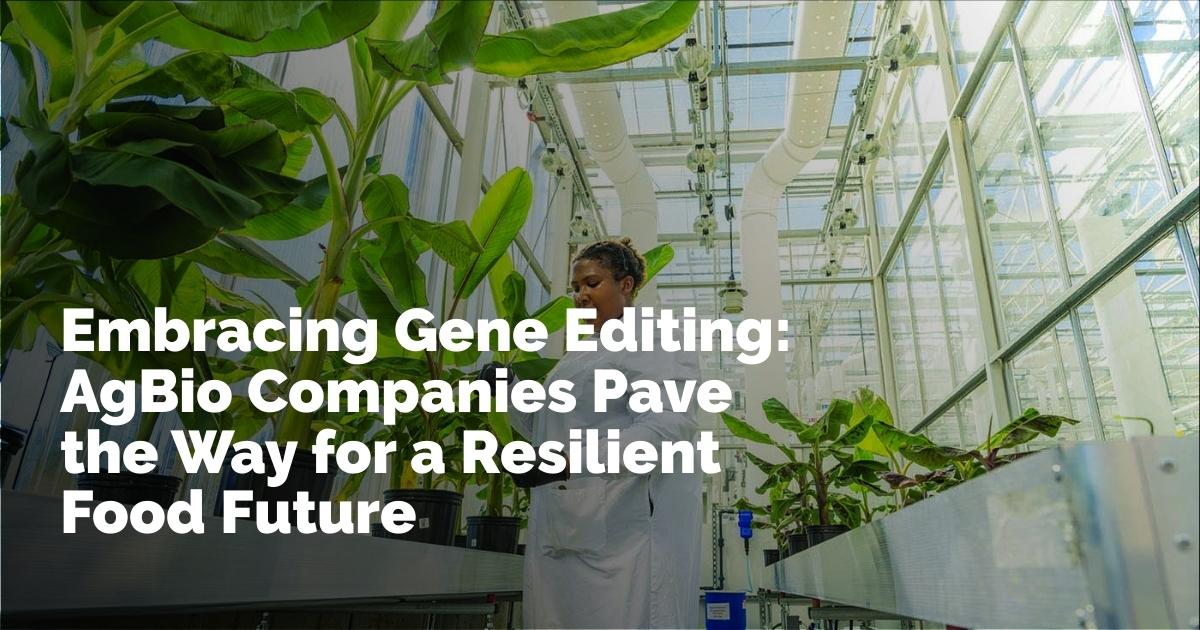AgBio Companies Embrace Gene Editing for a Resilient Agricultural Future
The Threat to the Cavendish Banana
The Cavendish banana is ubiquitous across grocery stores and households worldwide, acclaimed for its delightful flavor and ease of consumption. However, this cherished fruit faces an existential threat from Fusarium Tropical Race 4 (TR4), a pernicious fungus that invades the plant's vascular system, potentially triggering a crisis for banana growers globally. In a bid to safeguard this staple fruit, Elo Life Sciences, in conjunction with multinational giant Dole, is deploying advanced gene editing technologies to develop TR4-resistant banana variants that can still satisfy consumer taste expectations.
The Evolution of Gene Editing in Agriculture
The journey of gene editing in agriculture dates back over two decades, with Transfer DNA (T-DNA) technology being one of the first tools employed to enhance crops. Extracted from the tumor-causing bacterium Agrobacterium tumefaciens, T-DNA serves as a vector for transferring desired genes into plant genomes. Despite its pioneering role, T-DNA presents challenges, particularly the uncontrollable integration of new genes within target cells, sparking the evolution of more refined techniques like CRISPR. Today, CRISPR is revolutionizing the field, from its application in developing disease-resistant pigs by the British firm Genus to empowering companies like Elo Life Sciences and Inari to sustainably enhance crop yields and resilience.
Eremid Genomic Services, while not directly involved in gene editing, provides critical sequencing services to agbio companies, enabling precise assessment of editing outcomes and ensuring no unintended genomic alterations occur during the enhancement process.
The Promise of Rapid Development
For agricultural producers, traditional breeding is marked by long lead times—sometimes spanning decades—to bring improved crop varieties to market. In contrast, gene editing offers an expedited pathway, allowing scientists to generate and test new plant variants swiftly. As Eremid's Chief Scientific Officer, Dr. Julien Curaba, notes, this accelerated timeline is a critical advantage in meeting global food supply demands and addressing the adverse effects of climate change on agriculture. Furthermore, CRISPR is invaluable in academic research, aiding scientists in unraveling gene functions and their phenotypic impacts, thereby advancing targeted genetic improvements in food crops.
Harnessing AI in Gene Editing
The integration of artificial intelligence (AI) into gene editing heralds a new era in plant breeding. Dr. Catherine Feuillet of Inari identified CRISPR's transformative potential early on. Unlike predecessors like TALENs, which required bespoke production for each genetic edit, CRISPR offers agility and cost-effectiveness, ideal for multiplexing. At Inari, AI-driven predictive design tools collaborate with CRISPR to produce high-performance seed varieties in soybean, corn, and wheat.
Despite the successes of traditional breeding, which fundamentally enhanced global food security, such methods are time-intensive, relying on years of crossbreeding to achieve desirable traits. AI-powered technologies now enable scientists to efficiently sift through vast genomic data to expedite the breeding process, setting the stage for faster innovation.
Responding to Urgency
With climate change and new agricultural diseases posing continuous threats, the demand for rapid crop improvement is at an all-time high. Dr. Feuillet emphasizes the urgency, asserting that the industry must refashion crops within a maximum five-year window to ensure food security. Inari's platform, which combines computational modeling with gene editing, seeks to accelerate trait enhancement, targeting both yield boosts and resource-use efficiency—key traits necessary for sustainable agriculture.
To achieve this, Inari employs multiplexing, a strategy that involves editing multiple genes simultaneously to tackle complex agricultural issues. Such comprehensive editing is pivotal since singular gene modifications often fall short of addressing multifaceted agricultural challenges.
Generating Data for AI Models
One of Inari's key challenges is generating and harnessing data to refine AI models for plant breeding. Unlike the extensive genomic repositories available in pharmaceuticals, plant genome data are sparse. To bridge this gap, Inari is leveraging insights from scientists formerly engaged in drug discovery to sift through and extrapolate data from plant genomes. Given the complexity and duplication within plant genomes, such as the paleopolyploid nature of soybeans, these efforts are vital in structuring effective breeding strategies.
Field Testing and Validation
Despite significant advances in gene editing, the path from laboratory to market involves rigorous field testing to ensure trait stability and performance outside controlled environments. Inari's vision sees CRISPR as a tool that complements traditional breeding, accelerating the process to meet future agricultural demands.
Rescuing Endangered Crop Varieties
Elo Life Sciences stands at the forefront of preserving endangered crops through gene editing innovations. Committed to reshaping the future of food, Elo concentrates on bolstering the resilience of fruits and vegetables against challenges like climate change. As Dr. Matt DiLeo elucidates, identifying and editing specific genes can fast-track breeding processes traditionally bogged down by extensive crossbreeding.
While CRISPR has gained widespread acclaim, Elo has devised a proprietary protein-based editing technology, distinct from CRISPR, due to its precision and adaptability. This technology, predating even TALENs and zinc fingers, allows Elo to customize solutions fit for different crops, such as the partnership with Dole to engineer TR4-resistant bananas.
Collaborative Solutions in Agriculture
The ongoing struggle against TR4 highlights the necessity for collaboration between agricultural companies, universities, and tech developers. Elo's work with Dole exemplifies the potential of strategic partnerships in combating agricultural adversities through gene editing. Tailored for Cavendish bananas, Elo’s approach involves minor genome tweaks to enhance resistance, underpinning the broader industry effort to forestall widespread crop losses.
Expanding Impact Beyond Bananas
Beyond bananas, Elo is expanding its gene editing prowess to other collaborations, notably with NGOs focusing on crops crucial for subsistence farming like cassava. Elo envisages utilizing gene editing not just for economic gains but to bolster food security and sustainability worldwide, intertwining economic viability with global welfare.
As agricultural systems adapt to modern challenges, the confluence of cutting-edge gene editing, AI, and strategic alliances presents a transformative force capable of reshaping the future of food for a sustainable and resilient global harvest.
출처 : Original Source

